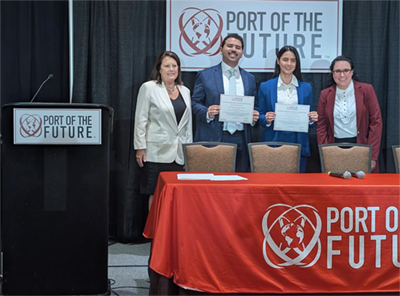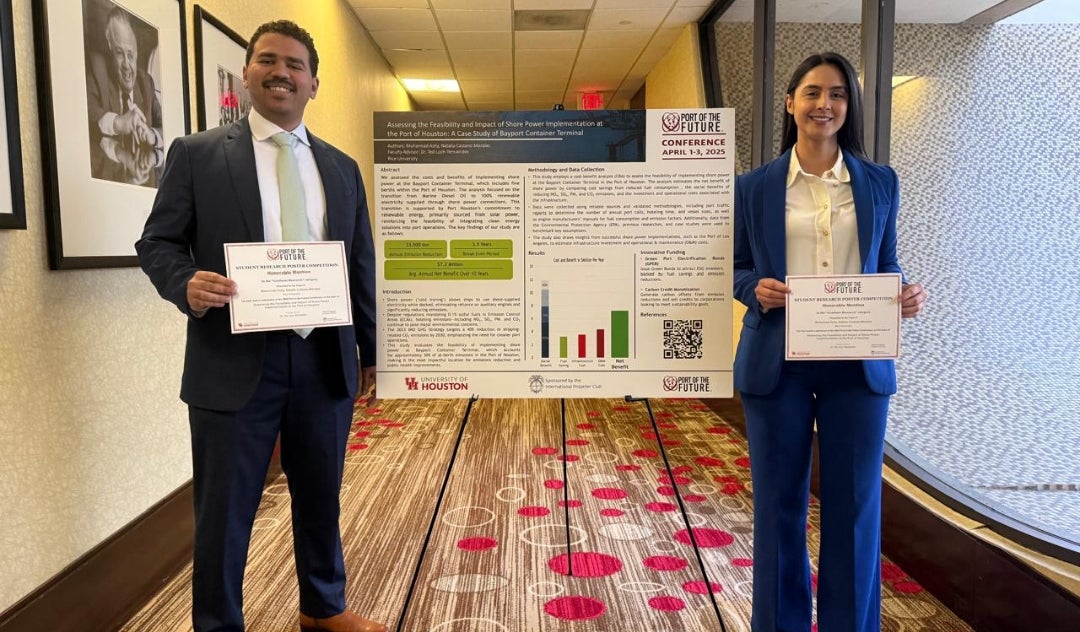Rice University Master of Energy Economics (MEECON) students Natalia Castaño Morales and Muhannad Ashy were recognized during the student poster competition at the Port of the Future Conference earlier in April. Hailing from across the world, Colombia native Castaño Morales and Saudi Arabia native Ashy have brought unique perspectives to their research project and to the MEECON program.
With a background in industrial engineering and human and organizational development management, Fulbright Scholar Castaño Morales worked in the power sector in Colombia for nearly nine years. Having a desire to deepen her education with a focus on the energy sector, Castaño Morales discovered Rice’s MEECON program.
“I selected this program in Houston, the energy hub of the world,” said Castaño Morales. “I thought that it was a great opportunity to develop technical skills, but also economic skills, to support strategic positions in the energy sector.”
Ashy, a marine engineer, has worked for Aramco in offshore and onshore technical positions for five years. The company sent him to Texas to pursue a master's degree in maritime business administration and logistics at Texas A&M-Galveston. During his time in the program, an economics course inspired him to pursue a second master’s degree – in energy economics.
“I couldn't have found a better place than Rice,” said Ashy. “This master's program is very practical and is good for everybody in the industry. For example, I'm a marine engineer; the knowledge that I have gained here will make me a better maritime expert.”

Hosted by the University of Houston, over 60 ports from around the world attended the 2025 annual Port of the Future Conference on April 1-3. This year’s conference focused on a range of topical themes, such as port development, port energy and sustainability, and decarbonization and alternate fuels.
“This event is really important for students to have a sense of how professionals speak and deal with business,” said Ashy. “It also shows these professionals how students approach challenges.”
After receiving encouragement from MEECON program faculty, Castaño Morales and Ashy submitted their project to the conference’s poster competition. The team’s poster, Assessing the Feasibility and Impact of Shore Power Implementation at the Port of Houston: A Case Study of Bayport Container Terminal, took home an honorable mention.
The MEECON team’s project assessed the cost and benefits of implementing shore power in the Bayport container terminal within Port Houston. Shore power, Ashy and Castaño Morales explained, is the practice of turning off a ship’s main diesel engine and powering it from the port’s shore-supplied electricity. They selected the Bayport container terminal because it represents almost 30% of the emissions in Port Houston. The team found that the implementation of shore power in the Bayport container terminal would reduce annual emissions by 23,500 tons and provide an annual $7.2 million net benefit over 10 years, reaching a break-even period at 3.5 years.
“Natalia and Ashy put together an ambitious, yet practical, framework and demonstrated to international stakeholders the impact of implementing shore power from an economic and social perspective,” said Ted Loch-Temzelides, George and Cynthia Mitchell Professor in Sustainable Development with the Department of Economics and Rice Scholar in Energy Studies with the Baker Institute. “We are all very proud of them for this well-deserved recognition.”
Castaño Morales and Ashy visited Port Houston with their cohort during the Fall 2024 semester. It was this trip, led by Rich Byrnes, chief infrastructure officer of Port Houston, that inspired their project.
“He explained to us the business, and he also explained to us the sustainability goals,” said Castaño Morales. “We could see the great work being done between academia, companies, and the industry and the positive results that come from working together.”
The MEECON program attracts local and international students who are seeking career advancement or exploring new vocational pathways. While completing their studies, the students are encouraged to take what they are learning in the classroom and apply it to real-world situations, as demonstrated in Castaño Morales’ and Ashy’s research.
“We are dedicated to helping our MEECON students make industry connections and share what they have learned through avenues such as the Port of the Future Conference,” said Peter Hartley, MEECON co-director and George A. Peterkin Professor of Economics. “We are very pleased that the Port of Houston has welcomed our MEECON students for field trips where they talk to them about the strong relationships between the Port and the Energy Industry in Houston.”
After graduation, Castaño Morales will complete her internship with Chord Energy in Houston, with plans to take the skills she has developed as a MEECON student and apply them to her work in the energy sector back home in Colombia.
“Of course, I would love to return to the United States, when possible, to work,” said Castaño Morales. “Here we have excellent opportunities – opportunities to work, to learn, and to develop a greater understanding of the energy sector.”
Ashy, too, will return to his home country of Saudia Arabia after graduation.
“It's really hard to imagine where somebody will be in five or 10 years,” said Ashy. “I think the best strategy is to keep pursuing every opportunity that comes your way and do your best in your daily tasks. Just pursue excellence in whatever you do, day by day.”
The Master of Energy Economics (MEECON) is a 12-month, full-time professional master’s program designed to educate future leaders and strategic thinkers in the energy sector. Students develop skills to provide insightful analysis of energy markets in order to inform future market orientation, capital asset decisions and firm strategic direction. Built upon programs in the Economics Department and the Baker Institute’s Center for Energy Studies (CES), the Master of Energy Economics provides a new avenue for energy professionals to develop human capital relevant for business development and/or strategic planning roles.
Photos: Natalia Castaño Morales

